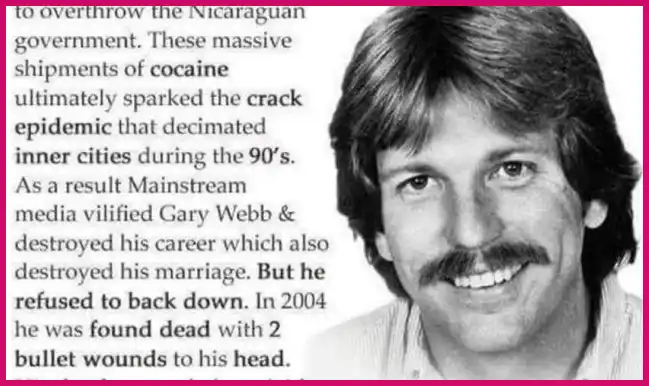The story of investigative reporter Gary Webb is one of modern journalism’s most controversial and tragic chapters. His 1996 “Dark Alliance” series ignited a firestorm by linking the CIA to the crack cocaine epidemic, and his subsequent death in 2004, officially ruled a suicide despite two gunshot wounds to the head, has fueled enduring theories of a conspiracy. The central question remains: Was Gary Webb a victim of a targeted assassination, or did he succumb to the pressures of a ruined career?
Table of Contents
What Was the “Dark Alliance” Series?
In August 1996, Gary Webb published a 20,000-word, three-part investigative series in the San Jose Mercury News. The series, “Dark Alliance,” made explosive claims:
- It alleged that a San Francisco-based drug trafficking ring, with ties to the CIA-backed Nicaraguan Contra rebels, sold massive amounts of cocaine in Los Angeles during the 1980s.
- The profits from these sales were then funneled back to fund the Contras’ war against the Sandinista government in Nicaragua.
- Webb argued that this influx of cheap cocaine was a primary catalyst for the devastating crack epidemic that ravaged inner-city communities.
The series did not claim the CIA directly sold drugs, but it heavily implied that the agency was aware of and turned a blind eye to the fundraising activities of its assets, effectively allowing American neighborhoods to be flooded with cocaine to finance a covert war.
The Backlash and Career Fallout
Initially, the series caused a sensation, particularly within the African American community, which had been disproportionately affected by the crack epidemic. However, the mainstream media soon mounted a ferocious counter-attack. Major outlets like The New York Times, The Washington Post, and the Los Angeles Times published lengthy articles scrutinizing Webb’s reporting.
Critics argued that Webb had overstated the evidence, made logical leaps, and failed to prove a direct link or knowledge on the part of high-level CIA officials. Under immense pressure, Webb’s own editor at the Mercury News published a letter backing away from some of the series’ more sweeping implications. Webb’s career was shattered, and he resigned from the paper in 1997.
The Lingering Questions and His Death
Despite the professional fallout, Webb’s core reporting was not entirely without merit. In 1998, a CIA internal investigation did acknowledge that the agency had worked with Contra-linked figures who were known to be involved in drug trafficking.
The ultimate tragedy came on December 10, 2004, when Webb was found dead in his home. The Sacramento County coroner’s office ruled his death a suicide, caused by two self-inflicted gunshot wounds to the head from a .38 caliber revolver. The official explanation for the two wounds is that it is rare, but possible, for a suicide attempt to involve an involuntary reflex that causes a second shot to be fired.
However, this official ruling has never satisfied Webb’s supporters. They argue that it is highly improbable for someone to shoot themselves in the head twice. For them, Webb’s death was not a suicide but an assassination—the final act in a campaign to silence a reporter who got too close to a dark truth about the connection between intelligence agencies and the international drug trade. His story remains a cautionary tale about the costs of challenging powerful institutions.
More Topics
- Rachel Scott Recognized for Challenging Vladimir Putin at Summit
- Mark Zuckerberg Spends $110 Million on Palo Alto Compound
- What Happened to Spanish Actress Ana Obregón’s Son – Welcomes Granddaughter via Surrogacy
- Trump-Putin Summit Centers on Ukraine War
- Russian President Praises ‘Constructive’ Alaska Summit with Trump, Hopes for Path to Peace in Ukraine
- National Lottery Set for Life Results for Thursday, August 14, 2025
- Bryan Kohberger Complains of ‘Psychological Torture’ from Inmates in Idaho Prison

